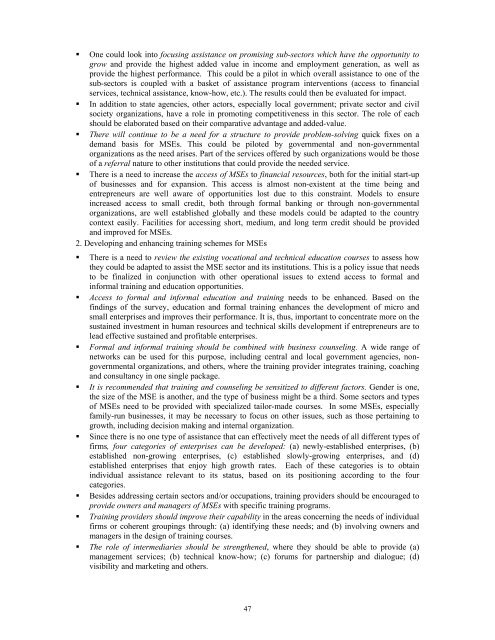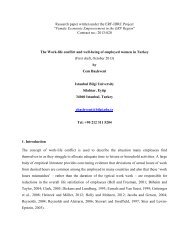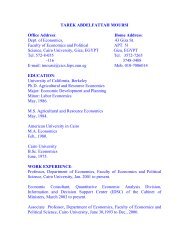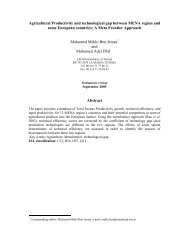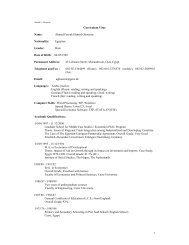MICRO AND SMALL ENTERPRISES IN LEBANON
MICRO AND SMALL ENTERPRISES IN LEBANON
MICRO AND SMALL ENTERPRISES IN LEBANON
You also want an ePaper? Increase the reach of your titles
YUMPU automatically turns print PDFs into web optimized ePapers that Google loves.
• One could look into focusing assistance on promising sub-sectors which have the opportunity togrow and provide the highest added value in income and employment generation, as well asprovide the highest performance. This could be a pilot in which overall assistance to one of thesub-sectors is coupled with a basket of assistance program interventions (access to financialservices, technical assistance, know-how, etc.). The results could then be evaluated for impact.• In addition to state agencies, other actors, especially local government; private sector and civilsociety organizations, have a role in promoting competitiveness in this sector. The role of eachshould be elaborated based on their comparative advantage and added-value.• There will continue to be a need for a structure to provide problem-solving quick fixes on ademand basis for MSEs. This could be piloted by governmental and non-governmentalorganizations as the need arises. Part of the services offered by such organizations would be thoseof a referral nature to other institutions that could provide the needed service.• There is a need to increase the access of MSEs to financial resources, both for the initial start-upof businesses and for expansion. This access is almost non-existent at the time being andentrepreneurs are well aware of opportunities lost due to this constraint. Models to ensureincreased access to small credit, both through formal banking or through non-governmentalorganizations, are well established globally and these models could be adapted to the countrycontext easily. Facilities for accessing short, medium, and long term credit should be providedand improved for MSEs.2. Developing and enhancing training schemes for MSEs• There is a need to review the existing vocational and technical education courses to assess howthey could be adapted to assist the MSE sector and its institutions. This is a policy issue that needsto be finalized in conjunction with other operational issues to extend access to formal andinformal training and education opportunities.• Access to formal and informal education and training needs to be enhanced. Based on thefindings of the survey, education and formal training enhances the development of micro andsmall enterprises and improves their performance. It is, thus, important to concentrate more on thesustained investment in human resources and technical skills development if entrepreneurs are tolead effective sustained and profitable enterprises.• Formal and informal training should be combined with business counseling. A wide range ofnetworks can be used for this purpose, including central and local government agencies, nongovernmentalorganizations, and others, where the training provider integrates training, coachingand consultancy in one single package.• It is recommended that training and counseling be sensitized to different factors. Gender is one,the size of the MSE is another, and the type of business might be a third. Some sectors and typesof MSEs need to be provided with specialized tailor-made courses. In some MSEs, especiallyfamily-run businesses, it may be necessary to focus on other issues, such as those pertaining togrowth, including decision making and internal organization.• Since there is no one type of assistance that can effectively meet the needs of all different types offirms, four categories of enterprises can be developed: (a) newly-established enterprises, (b)established non-growing enterprises, (c) established slowly-growing enterprises, and (d)established enterprises that enjoy high growth rates. Each of these categories is to obtainindividual assistance relevant to its status, based on its positioning according to the fourcategories.• Besides addressing certain sectors and/or occupations, training providers should be encouraged toprovide owners and managers of MSEs with specific training programs.• Training providers should improve their capability in the areas concerning the needs of individualfirms or coherent groupings through: (a) identifying these needs; and (b) involving owners andmanagers in the design of training courses.• The role of intermediaries should be strengthened, where they should be able to provide (a)management services; (b) technical know-how; (c) forums for partnership and dialogue; (d)visibility and marketing and others.47


